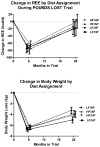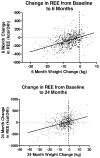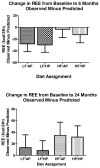Effect of diet composition and weight loss on resting energy expenditure in the POUNDS LOST study
- PMID: 22627912
- PMCID: PMC3760199
- DOI: 10.1038/oby.2012.127
Effect of diet composition and weight loss on resting energy expenditure in the POUNDS LOST study
Abstract
Weight loss reduces energy expenditure, but it is unclear whether dietary macronutrient composition affects this reduction. We hypothesized that energy expenditure might be modulated by macronutrient composition of the diet. The Prevention of Obesity Using Novel Dietary Strategies (POUNDS) LOST study, a prospective, randomized controlled trial in 811 overweight/obese people who were randomized in a 2 × 2 design to diets containing 20en% or 40en% fat and 15en% or 25en% protein (diets with 65%, 55%, 45%, and 35% carbohydrate) provided the data to test this hypothesis. Resting energy expenditure (REE) was measured at baseline, 6, and 24 months using a ventilated hood. REE declined at 6 months by 99.5 ± 8.0 kcal/day in men and 55.2 ± 10.6 kcal/day in women during the first 6 months. This decline was related to the weight loss, and there was no difference between the diets. REE had returned to baseline by 24 months, but body weight was still 60% below baseline. Measured REE at 6 months was significantly lower than the predicted (-18.2 ± 6.7 kcal/day) and was the result of significant reductions from baseline in the low-fat diets (65% or 55% carbohydrate), but not in the high fat diet groups. By 24 months the difference had reversed with measured REE being slightly but significantly higher than predicted (21.8 ± 10.1 kcal/day). In conclusion, we found that REE fell significantly after weight loss but was not related to diet composition. Adaptive thermogenesis was evident at 6 months, but not at 24 months.
Figures



References
-
- Bray GA. A Guide to Obesity and the Metabolic Syndrome: Origins and Treatment. New York: CRC Press: Taylor and Francis Group; 2011.
-
- Freedman MR, King J, Kennedy E. Popular diets: a scientific Review. Obes Res. 2001;9:1S–39S. - PubMed
-
- Sacks FM, Bray GA, Carey VJ, Smith SR, Ryan DH, Anton SD, McManus K, Champagne CM, Bishop LM, Laranjo N, Leboff MS, Rood JC, de Jonge L, Greenway FL, Loria CM, Obarzanek E, Williamson DA. Comparison of weight-loss diets with different compositions of fat, protein, and carbohydrates. N Engl J Med. 2009 Feb 26;360(9):859–73. - PMC - PubMed
-
- Dansinger ML, Gleason JA, Griffith JL, Selker JP, Schaefer EJ. Comparison of the Atkins, Ornish, Weight-Watchers, and Zone diets for weight loss and heart disease risk reduction: a randomized trial. JAMA. 2005;293:43–53. - PubMed
Publication types
MeSH terms
Substances
Grants and funding
LinkOut - more resources
Full Text Sources
Other Literature Sources
Medical

